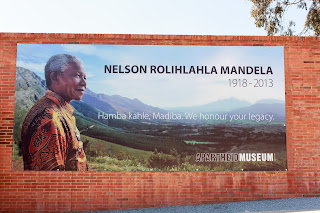NELSON MANDELA: THE HUMBLE HERO
Nelson Mandela is always at the top of my list when asked whom I'd like to meet. I was fortunate to have lived in South Africa while he was President, although I only lived there for one year of his presidency. I never had the opportunity to meet him, but I remember trying to get a glimpse of him when I passed his compound in Johannesburg.
I'm currently reading The Prison Letters of Nelson Mandela. I had recommended the book to my book club because of my admiration for Nelson Mandela and the many fond memories of living in South Africa. When I suggested it, I didn't realize how tedious the book would be. The book, over 600 pages, not only contains his letters for 27 years of imprisonment, but almost every page has a quarter of footnotes in the tiniest font imaginable.
When I first started reading the book, it was apparent that each letter he wrote was with the censors in mind. Many of his letters never reached the recipient because they were deemed subversive. It was often mutilated when they received a letter from him, with large portions destroyed. At first, the letters included in the book seemed carefully written with mostly pleasantries, which I found almost dull. After I got into his head a little and understood his constraints when writing letters, I found them intriguing.
I have a habit of reading for an hour or two before I go to sleep. Every night, I look forward to getting into bed and reading more letters from Mandela to his friends, family, and prison officials. There are about 100 pages left in the book. I don't want it to end, as I will mourn his passing when the book is finished, even though he died in 2013 at the age of 95. He was in prison when his mother, a son, and many other family and friends passed away. He was not allowed to attend their funerals. He sacrificed what would have been a career as a lawyer and a family life with his young children, whom he never had the pleasure of watching grow up. He never lost sight of why he was in prison and kept an unwavering optimism that the world, specifically South Africa, would right itself and all people would be treated equally.
I recall the outcry all over the world about Nelson Mandela's imprisonment. His name was frequently invoked along with the phrase, "Hold on, Mandela." He never heard those words while he was in prison. He never knew that millions were praying for him and pleading with those in charge to release him until he was finally freed. Yet, his faith remained unwavering. He knew something more significant to be achieved and viewed his role as only a tiny part of changing the world.
After becoming President, he appointed a "Truth and Reconciliation Commission," led by Bishop Tutu. We would hear testimony every day from thousands of people who had been victims of South Africa's brutal treatment of Black Africans, who were the overwhelming majority of people living in South Africa. Currently, only 8% of the country's population is White. At least a million Whites fled South Africa after apartheid was abolished. While I lived there, leaving South Africa was the dominant part of the conversation when I was around Whites.
During my time in South Africa, I became acquainted with a former member of the Security Force. During the many years of apartheid, this branch of law enforcement was responsible for thousands of murders and mistreatment of Blacks. He would describe some of the atrocities they committed in a calm voice without even a smidgen of remorse. While apartheid might have ended, the deeply entrenched prejudices of Whites lingered. While it may seem that our country is experiencing a resurgence of racism, racism has always been under the surface.
Nelson was vocal in his desire to unite the country after apartheid ended. He believed in forgiveness, even for those who imprisoned and mistreated him while he was incarcerated.
The "take-away" for me is to continue standing up, speaking out, and taking action against injustice. I'm no Nelson Mandela, but I can do my small part in this tiny corner of the world. Let his legacy be like a beacon for all of us.
"A new world will be won not by those who stand at a distance with their arms folded, but by those who are in the arena, whose garments are torn by storms & whose bodies are maimed in the course of the contest," wrote Nelson Mandela.




Comments
Post a Comment